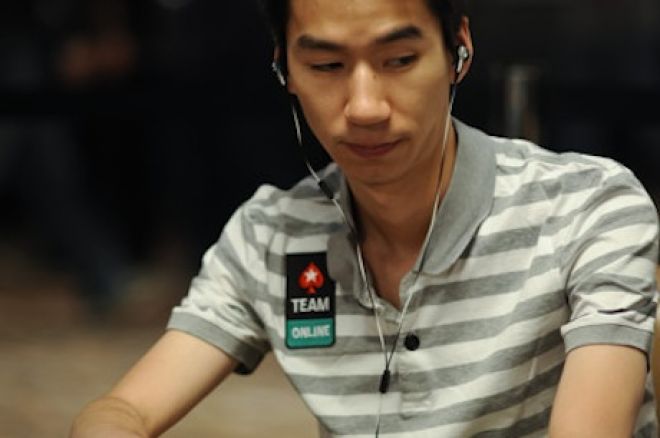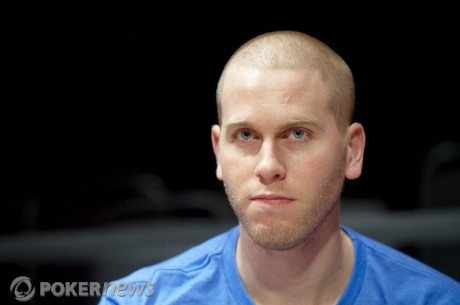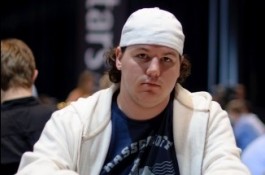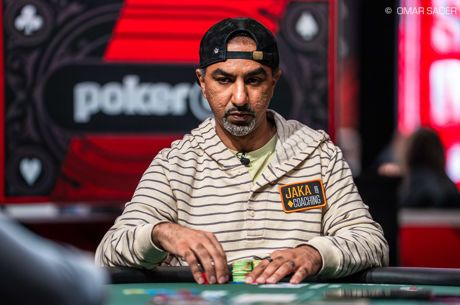Randy Lew Discusses a Hand from the World Series of Poker

Randy "nanonoko" Lew is known for crushing as a mass multi-table cash-game player online. His ability to hand read and quickly asses his opponents is unrivaled. This summer, Lew has a large slate of events he plans to play at the 2011 World Series of Poker, including the $1,500 Triple Chance No-Limit Hold'em event. He talked to PokerNews about a hand he played in the first level of the tournament.
Level 1: 25/25
Stacks: Randy Lew - 4,500; Villain - 2,400
Preflop Action: Randy Lew raised in the cutoff to 75 with K?8?. The button called, and the action folded around.
What is your general preflop raise size early in tournaments like this?
Early in tournaments, I make it three times the big blind because if you min-raise, they almost always call in the first level.
What was your impression of the player who flatted you?
He did some weird things, so it kind of led me to think he wasn't an online regular. He was also playing more hands, so with that, I just assumed he was a bit "loosey goosey."
So his range is pretty wide for calling in position here on the button?
Yes, it's very wide, much more wide that a regular, solid player would have.
Flop Action: The flop came K?K?7?. Lew bet 125. Villain called. The pot is now 475.
The reason I chose to bet instead of check, despite my hand being so strong, is because very early on in the tournament in the first couple of levels, trapping isn't as important. If I check and induce a bet from him, I'm only going to win 100 in chips, and that's just not that many. It's better for me to try and bet and make a really big pot. Later in tournaments though, like if I was at a final table or something, each bet is much more important. I chose to try and make a bigger pot.
When he calls you on the flop, how does this narrow his range?
When he calls on this flop, he can have any seven, any pocket pair, and maybe a king.
Do you think he was capable of floating you here?
I don't think he has any pure floats. If he does, he has like ace-high. I don't imagine he was that complex to do that.
Turn Action: The turn was a 3?. Lew bet 300. Villain instantly raised to 1,200. Lew went all in, and Villain called off the rest of his stack with A?7?. Lew won the pot with K?8?.
Was your thought process on the turn, the same as on the flop as far as wanting to build a pot?
A continuation bet is kind of standard for me, everyone expects that, so the turn is kind of a bigger decision for me. Like I said earlier, by checking, I might induce him to bet maybe 200 on this street with a bluff or a pair, but again, I want to continue building the pot. By betting here, I give him a chance to raise with a flush draw as well. Plus, with the second flush draw coming on the turn, it just gives me more of a bluffing range, so he might call me lighter with a pair or a seven. I just figured that nothing much really changed for his hand for him not to continue.
How did you choose your bet sizing?
Typically, I'd bet smaller on the turn, but as I said before, he seemed a bit looser. I didn't think my bet-sizing mattered to him. When he snap-raised me, I knew he only had about 1,000 behind. I figured he might have me beat already with a better king, but he might also have a flush draw, or just be doing something weird. He had less chips than the starting stack, so he might have been thinking he could double up here or bust early. I chose to call all-in to play a big pot like I was trying to do.
So in general, you want to avoid slow-playing early in tournaments.
Yes. You might slow-play and get an extra 100 chips, or you might miss out on getting 2,300 in chips.
Remember, follow us on Twitter for up-to-the-minute news.








